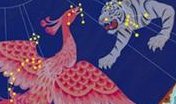Once again, the Milky Way runs in the direction southwest (toga) and Sun as a land animal (White Tiger) cannot cross this great River. He is forced to follow the Milky Way further and further down. Fire is incompatible with water. His last station could be Sirius, probably in the center of the Chinese asterism Well. This watery position could mark his 'death' as a tiger. Sirius can be visualized as the pupil in the great eye formed by the 13 stars in the surrounding ring. The word pupil means, among other things, a little doll - not the real thing - only a puppy: ... Pupils cannot be large in intensive light ... Oxford Dictionary of English Etymology: pupa ... chrysalis ... modL. use by Linnæus (1758) of L. pūpa, doll; cfr PUPPET. puppet ... †doll; (human) figure jointed and moving on strings or wires ... lathe-head ... chrysalis ... form taken by an insect in the stage between larva and imago ... L. chrysal(l)is ... Gr. khrūsallis gold-coloured sheath of butterflies, f. khrūsós gold ... imago ... (entom.) final stage of an insect ... Mod. use (by Linnæus, 1767) of L. imāgō IMAGE. image ... artificial representation of an object, likeness, statue; (optical) counterpart ... mental representation ... rel. to IMITATE ... A faint echo of this story of mine seems to have survived in Easter Island myth, because it was said that the last feat of King Hotu Matua was to dig wells. This is described in The Eighth Land (p. 222): "Among Hotu Matua's last accomplishments were his attempts to dig wells (anga i te vai, TP:53) along the shore of Akahanga. My informant did not mention these endeavors, but since Easter Island has neither streams nor wells, the supply of fresh water, aside from the three crater lakes, presents a real problem (HM:281-292). Recent trial excavations in the area of Akahanga have shown that this area was ideal for the establishment of wells. The dying king has his foster child bring him his last drink of water (vai maunga mo unu) from neighboring Huareva, a sure indication of the success of his last efforts to better the lot of the settlers (TP:55). After leaving the residence of Akahanga, Hotu Matua goes to the northern rim of the volcano Rano Kau." From the Spirit Leaping Place (Reiga) at the rim of Rano Kau his Spirit (Soul) evidently had to transform itself into a flying bird in order to find a better place, to quickly transmigrate. 
The Spirit Bird of Sun possibly corresponds to the Chinese station Ghost.
Its leading star is said to be 'q Cancri'. Strangely the internet site Chinese Astronomy never uses Greek letters for the stars, e.g. is Tejat Posterior (μ Gemini) referred to as 'm Gemini'. However, there is no Greek letter corresponding to the letter 'q'. Possibly the idea is to refer to the ancient Greek letter koppa, a reasonable sign for something dead and only living on in peoples' minds. There is no star q Cancri (or similar) according to Wikipedia.
The otherwise most obvious choice could have been the Beehive star (ε Cancri), where the Bees (flying souls) should swarm around. Allen: "In China it was known by the unsavory title Tseih She Ke, Exhalation of Piled-up Corpses ..."
... From a religious point of view, the high regard for flies, whose increase or reduction causes a similar increase or reduction in the size of the human population, is interesting, even more so because swarms of flies are often a real nuisance on Easter Island, something most visitors have commented on in vivid language. The explanation seems to be that there is a parallel relationship between flies and human souls, in this case, the souls of the unborn. There is a widespread belief throughout Polynesia that insects are the embodiment of numinous beings, such as gods or the spirits of the dead, and this concept extends into Southeast Asia, where insects are seen as the embodiment of the soul ...
|